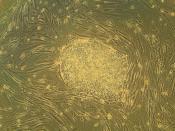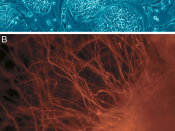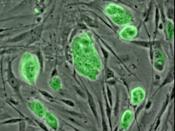Science and technology have caused great leaps in the advancement of human nature. It has aided in saving the lives of millions, yet ironically it has also deliberately taken lives away from those who are innocent and have no means of defending themselves.
One branch of science that has recently been growing is embryonic stem-cell research. This research is beneficial in many ways, but it also has a disadvantage. In order to obtain the purest stem-cells, researchers must extract them from embryos in the womb. In doing so, they are putting the lives of innocent babies who are still forming at risk. Since embryonic stem-cell research is an immoral act in which innocent lives are put at risk, or even taken away, this research should be restricted solely to embryos and cells that have been naturally emitted from a woman's body.
Stem-cell research has grown over the past few years because new developments continue to emerge.
With the help of embryonic stem-cell research, those who are unfortunate enough to be diagnosed with serious diseases such as Alzheimer's or Parkinson's disease, have the opportunity to overcome the disease with embryonic stem-cells ("The Great Debate Over Stem-cell Research."). Stem-cells can be extracted from healthy adults, but these cells are only specific such as liver or blood cells. Also, it is difficult to find the right stem-cell that matches the kind of cell that is needed. The purest stem-cells, which are in great need, can only be extracted from embryos that are still developing in the womb.
Stem-cells that originate from embryos are superior to adult stem-cells because they have the capability to be manipulated into any kind of cell that the researcher desires ("Stem-cell Research and the Human Embryo: Part 1"). It is hard to extract the cells from the...


